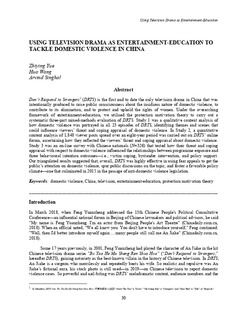Using television drama as entertainment-education to tackle domestic violence in China
Journal article, Peer reviewed
Published version
Date
2019Metadata
Show full item recordCollections
Original version
Journal of Development Communication. 2019, 30 (1), 30-44.Abstract
Don’t Respond to Strangers (DRTS) is the first and to date the only television drama in China that was intentionally produced to raise public consciousness about the insidious nature of domestic violence, to contribute to its elimination, and to protect and uphold the rights of women. Under the overarching framework of entertainment-education, we utilised the protection motivation theory to carry out a systematic three-part mixed-methods evaluation of DRTS. Study 1 was a qualitative content analysis of how domestic violence was portrayed in all 23 episodes of DRTS, identifying themes and scenes that could influence viewers’ threat and coping appraisal of domestic violence. In Study 2, a quantitative content analysis of 1,848 viewer posts spread over an eight-year period was carried out on DRTS’ online forum, ascertaining how they reflected the viewers’ threat and coping appraisal about domestic violence. Study 3 was an on-line survey with Chinese nationals (N=326) that tested how their threat and coping appraisal with respect to domestic violence influenced the relationships between programme exposure and three behavioural intention outcomes—i.e., victim coping, bystander intervention, and policy support. Our triangulated results suggested that, overall, DRTS was highly effective in using fear appeals to get the public’s attention on domestic violence, spur public discussions on the topic, and foster a favorable policy
climate—one that culminated in 2015 in the passage of anti-domestic violence legislation.
